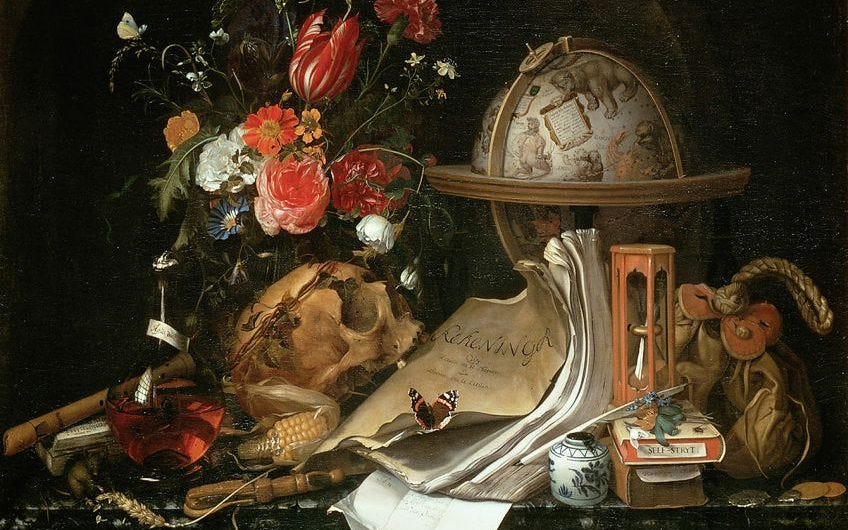Death may be the end, but maybe it isn’t
Recognising our false assumptions about death can help bring meaning to life
Many secular people today default to the assumption that death is a kind of black void. Consciousness dissipates like a puff of smoke and we enter a deep sleep from which there is no possibility of waking.
This is an odd way of thinking about death. Death is a human universal, many civilisations have had ample time to consider its implication. Yet, among all of these cultures, ours is the first where the idea of nothingness has taken hold.
In the Abrahamic traditions there is a general acknowledgement of the continuation of the soul. In South Asian traditions like Hinduism and Buddhism death is one step leading on to rebirth in an endless cycle. And, early myths from around the world are shockingly consistent in having some conception of an after-life. Our sense of death as nothingness is a definite historical oddity.
Not only is our idea of death unique, it is also held with an anachronistic certainty. Our postmodern condition means we are skeptical of most grand narratives of science, religion, politics, philosophy, and art yet in this one domain we seem to have an unshakeable faith. For older traditions death was associated with particular beliefs about what happened next, yet at the same time, it remained somewhat mysterious. The certainty that we have developed around what happens after we take our final breath is a profound mistake.
This error is brought into sharp relief by Hamlet's question: “To be, or not to be?”. In his soliloquy Hamlet ponders the question of suicide. He begins, helpfully, with the modern idea. To die would mean to sleep, to end all the suffering of life. Why then would he not do it?
To be, or not to be, that is the question:
Whether 'tis nobler in the mind to suffer
The slings and arrows of outrageous fortune,
Or to take arms against a sea of troubles
And by opposing end them. To die—to sleep,
No more; and by a sleep to say we end
The heart-ache and the thousand natural shocks
That flesh is heir to: 'tis a consummation
Devoutly to be wish'd. To die, to sleep;
To sleep, perchance to dream—ay, there's the rub:
For in that sleep of death what dreams may come,
When we have shuffled off this mortal coil,
Must give us pause…
The rub, the fundamental issue, is we do not know, and cannot know, what happens to us after death. We have assumptions of varying reasonableness but we cannot predict with accuracy what is to become of our consciousness nor how our actions might echo in eternity long after we are gone.
When I first really heard Hamlet’s soliloquy it shook me to my core with a sense of mystery and fear. I had never really questioned my basic beliefs, leading from my scientific world view, about the finality of death. I had been oblivious to the knowledge that I actually had and to the implications of my assumptions.
In fact, the idea that death is akin to a deep sleep is a kind of cop out. If at some point this journey will end without a trace it makes a mockery of the concern we have for our failures and successes here and now. It allows us to avoid taking responsibility for the full meaning and import of our actions. To believe that we have certainty that death will bring a close to the concerns of life leads to a kind of cowardice.
Personally, my basic assumptions around death remain similar to the secular people I described at the beginning. Deeply understanding that death may be not just an end but also a beginning is hard. It is at odds with many of the axioms of modern life. The implications are also shocking. There is a great deal of fear that is rightly associated with realising that we must live without knowing what will come after death.
Yet, in the moments that I properly glimpse this state of affairs it transforms my life. Realising that death is not the end of the story opens the capacity for embracing the meaning in this life.
Try to reframe what death might mean. What you hold so certain today may not be quite so true. When you glimpse the real scope of what death could be for you it will change your life.
Links
The Volition Podcast 🎙
A few weeks ago I started a new podcast! You can read more about my aims in the Twitter announcement thread. The first two episodes were conversations with Ben Sehl, the co-founder of Kotn, and Linda Lebrun, the lead for finance writer recruitment at Substack.
Building First Hand Food
One of the things that is lost in the urbanism that defines most large cities today is a lack of connection to the agriculture that makes this way of living possible. This brings with it a profound ignorance of the systems that support our lives (often dramatised through silly studies that show kids think bacon is a plant). The linked thread details a beautiful attempt to rectify this by building small scale intensive agriculture in a dense urban environment.
Energy Too Cheap to Meter
The most recent issue of Works In Progress, is excellent in its totality. The lead article on how to get back to the future by dramatically ramping up energy production is particularly inspiring.
Careful Words
A better Thesaurus from Simon Sarris. If you are a regular thesaurus user but disappointed by how tired it leaves your language I would recommend bookmarking this site.



